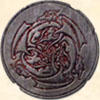Chapter 1 - Non-weapon Proficiencies
Bartering Non-weapon Proficiency
(must be a Barbarian )
This proficiency, which simulates an expertise in trading and appraising, has two applications: Value Check. With a successful proficiency check, the character can access the approximate value of a common item (a spear, a chicken, a bag of rice). The proficiency only works on items with an actual value of 50 gp or less. It does not work on magical items. A character may make only one attempt per item. The DM makes the proficiency check in secret. If the check fails, the character receives no special information. If the check succeeds, he has correctly determined the value of the item within 10%. (Tell the player the value of the item, plus or minus 10%, or gives him a range within these values.
For instance, if the actual cost of a small canoe is 30 gp and the check succeeds, any of the following responses are appropriate: about 27 gp, somewhere between 28 and 30 gp, close to 33 gp.) On a natural roll of 1, the character has assessed the exact price. On roll of 20, the assessment is wildly inaccurate (the DM might tell the player that a 30 gp canoe is worth 50 gp, somewhere between 1-5 gp, or nothing at all). Note that value of an object may be different from the asking price; the seller is free to set prices as he sees fit. Discount Check. This proficiency can also help the character purchase items at bargain prices through intimidation, stubbornness, and sheer force of penalty. The character must indicate a particular item (worth 50 gp or less) and make a proficiency check. If the check succeeds, the character may buy the item at up to 20% less than the asking price. The DM determines the discount (between 10-20%); if he prefers, he may determine the discount randomly (roll ld4 and multiply the result by 5%). If the check fails, the buyer receives no special benefit from the proficiency (he may still purchase the item at the asking price). On a natural roll of 1, the buyer receives a 30-50% discount (DMs option). On a roll of 20, the seller becomes offended by the buyer's attitude and refuses to sell anything at all to him. Only one discount check may be made per item. However, both a value check and a discount check may be made on the same item (the discount check may be made regardless of the outcome of the value check).
Whenever practical, values should be expressed in a medium of exchange used in the barbarian's homeland. If a barbarian commonly trades bobcat furs (worth 2 gp each) and correctly determines the value of a small canoe (worth 30 gp), the DM might tell him the canoe is worth about 15 bobcat furs or between 14 and 16 bobcat furs.
If he makes a successful discount check, and the DM decides to give him a 20% discount, the canoe will cost him 12 furs. Fractional values should be resolved in favor of the seller; if the barbarian receives a 30% discount on a 30 gp canoe (for a final price of 21 gp), the canoe will cost him 11 furs (valued at 22 gp).
